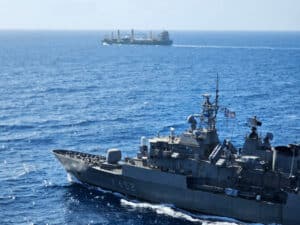
Inmarsat research shows owners warming to IoT based solutions
Written by Nick Blenkey
JUNE 7, 2018 — Research commissioned by Inmarsat indicates that the maritime industry is readier to adopt analytic, management and operational tools applied through the Internet of Things (IoT) than many commentators had supposed.
The release of “Industrial IoT: Maritime” coincides with Posidonia 2018 and is part of the Inmarsat Research Program 2018, which provides a cross-sectoral study on digitalization in the global supply chain and is due for publication June 26. The full report is based on 750 interviews conducted by technology market research company Vanson Bourne. It investigates use of, attitudes to and predictions for IoT-based solutions across the maritime, transport and logistics, energy, mining and agriculture sectors.
The 125 maritime respondents include owners from across the board in terms of fleet size, with owners from Greece making up the largest constituency (25), followed by Japan (20) and Germany (15). Ship types are spread across the container, tanker, bulker, gas, offshore and fishing vessel segments.
“This is probably the most detailed account of attitudes towards the IoT ever undertaken in the maritime industry, and its findings will surprise many,” says Stein Oro, VP of Applications Sales, Inmarsat Maritime.
“Respondents suggest that their average expenditure per business on IoT-based solutions will amount to US$2.5 million over the next three years. They say that IoT-based solutions will attract a larger share of their IT budgets than any other ‘next generation’ technology, while early analysis of other segments places maritime ahead of energy, agriculture and mining.”
Given the release of the report during Posidonia, it is interesting to note that Greek owners envisage substantially smaller outlays on IoT-based solutions in the period ahead, with the average investment planned for the coming three years less than 10% of the average overall. While overall expectations from three quarters of respondents are that they will “fully deploy” IoT-based solutions within 18 months, while the equivalent figure for Greek respondents is 40%.
Looking at costs, although 51% of respondents say that revenue generation does not figure in their considerations, 75% say that they have realized, or expect to realize savings using the IoT. Route optimization is typical and is identified by 57% as in use or on trial.
Regulation is also prompting adoption of IoT based solutions. With emissions rules tightening, 65% of respondents say they already use IoT-based solutions to monitor fuel consumption.
Inmarsat is currently involved in a number of application and IoT projects in the maritime sector as part of its Certified Application Provider programme working with companies such as Rolls-Royce and Samsung Heavy industries to provide energy management and remote monitoring applications.





Leave a Reply
You must be logged in to post a comment.